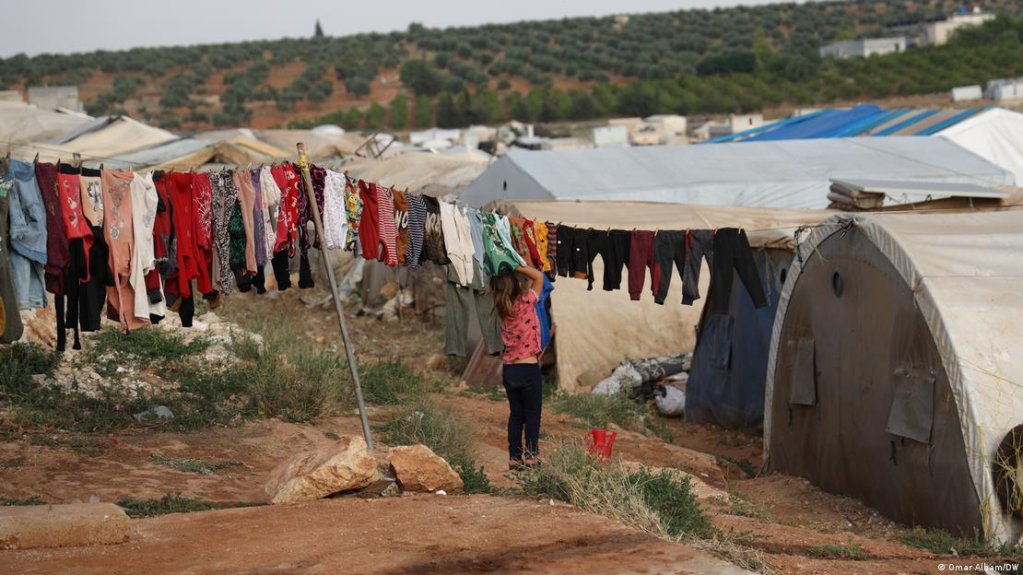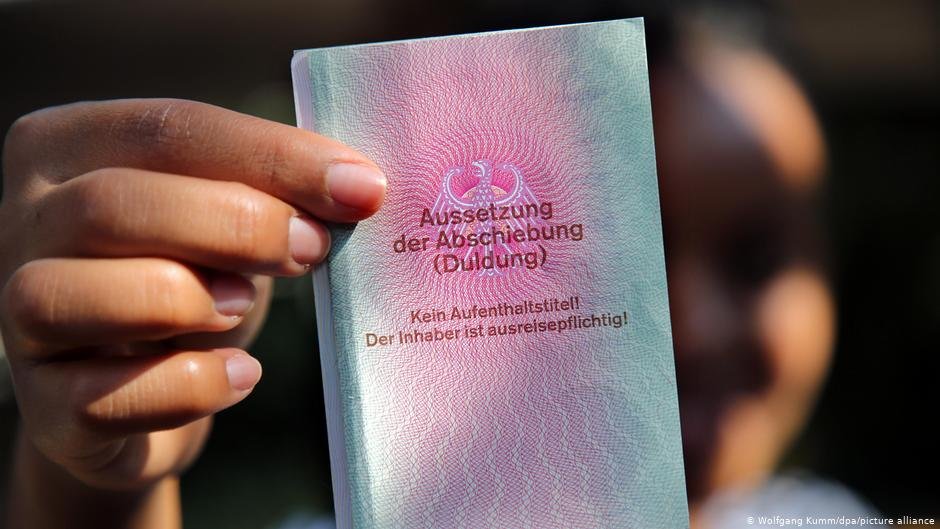Germany's Federal Office for Migration and Refugees (BAMF) has initiated legal proceedings against more than 2,100 persons with protection status who stand accused of having traveled to their home countries. Under German law, travelling to your country of origin typically results in your protection status being revoked.
In the past six months, protection status revocation proceedings were initiated on a total of 2,157 cases of people taking temporary journeys home to their country of origin, a spokesperson for BAMF told Germany's weekly Welt am Sonntag newspaper.
The two countries with the most cases of such unauthorized trips were Iraq and Syria, with 762 and 734 instances, respectively. These were followed by Afghanistan (240), Iran (115) cases and Turkey (31).
Under German law, protection status can be revoked if a person travels back to their home country. The reasoning behind this rule is that if their country is safe enough for a visit, they evidently do not suffer sufficient levels of persecution there.
Read AlsoGermany: Debate over visits to home countries by refugees
No protection status upon return
If BAMF or other authorities learn that an asylum seeker or person with any other type of protection status returned to their country of origin, a "revocation review file" is automatically generated to document the case and review what further steps might need to be taken.
Last year, procedures for such revocations were further tightened and streamlined as part of a "security package" of new laws after a series of violent attacks in Germany. In some of those instances, it was later found that the perpetrators had traveled back home, where they were radicalized, and only traveled back to commit acts of terror.
Read AlsoFact check: Deportation misinformation in Germany
It should be noted that journeys to home countries for whatever reason are not the only reasons under which protection in Germany can be revoked.
Other such instances include asylum seekers who commit serious crimes, which result in prison sentences lasting over 12 months.
Furthermore, protection can also be revoked if the situation in the country of origin improves.
There are exceptions to this generic rule, foremost for "morally imperative" reasons, for example to bury close relatives after a death. In such instances, the journey has to be cleared with the authorities in advance.
Also, Ukrainian war refugees are exempt from this rule and can go back and forth between their country and Germany under an EU directive taken at the beginning of the Russian invasion three years ago.
Government mulling special provisions for Syrians
The issue of revoking protection for refugees who travel to their home country has been a particularly contentious issue, especially of late:
The incoming German government has announced plans to also allow for further exceptions for Syrian nationals after the liberation of their country from the Assad regime in December 2024.
Under this plan, Syrians would be allowed to return to their home country for a limited period of time if they are potentially "preparing for a permanent return."
Specifically, the incoming governing coalition says it would like to allow Syrian nationals to either return for four weeks once or for a two-week period twice to ascertain whether or not rebuilding their lives back home would be feasible.
Under the coalition agreement, such trips could for example serve the purpose of assessing what kind of infrastructures remain intact in people's home towns, and to see whether after 14 years of conflict, their properties and homes remain intact.
Read AlsoGermany wants to allow Syrian refugees to visit home

CSU seeks to derail coalition plans
This plan, however, has been rejected by one of the coalition partners: The CSU -- the Bavarian sister party of the Christian Democrats, who won the biggest share of the vote in federal elections in February, does not want to make special provisions for any particular group of asylum seekers.
Bavaria's Interior Minister Joachim Herrmann from the CSU said it's impossible under federal law to make unique exceptions for Syrians.
According to Herrmann, any such exceptions would also give way to considerable welfare benefit questions, such as the granting of social benefits during such trips.
He cautioned that the impression could arise that the government was funding such trips or offering any other kind of incentive for people to "vacation" in Syria.
Read AlsoAllow Syrians to go back for short visits, EU activists say
Financial incentives for voluntary returns
However, financial incentives for returning Syrians already exist in Germany.
Those wishing to return for good receive financial support from BAMF -- the sum of which can vary according to certain factors such as marital status and number of children. A maximum of 4,000 euros can be made available per family returning to Syria.
According to the BAMF, this financial assistance is intended to cover travel costs, financial start-up assistance and, if necessary, medical costs.
The Federal Ministry of the Interior meanwhile announced that since the fall of Assad in late 2024, only 464 Syrians had voluntarily returned to their home country from Germany under these schemes.
However, by the end of this year, up to one million Syrians in exile around the world are expected to have come back to their homeland, with UNHCR already counting 300,000 returns since the end of the Assad regime.
Read AlsoGermany: Financial incentives offered to Syrians to return home
Pro Asyl: Syria still not safe
The migrant rights organization Pro Asyl meanwhile said the incoming government must tread carefully around the issue of any returns -- voluntary or forced -- to Syria.
The group stressed that Syria is "not a stable country," adding that "(a)ny debate about a return is unrealistic and premature" amid ongoing acts of violence in parts of the country and growing uncertainty over the country's political direction in the future.
Pro Asyl also said that they supported the government plan to allow Syrian refugees to travel to their home country, while stressed that their motivation primarily was "not primarily to explore a return, but for example to look for relatives or to participate in reconstruction," and that these trips should not be subject to any rules.
To this end, Pro Asyl believes that a similar policy should be in place with Syrians as there is EU-wide already with Ukrainian war refugees.

Read AlsoGermany: Coalition expected to pursue Syrian returns as soon as feasible
Unprotected and undeportable
Meanwhile, BAMF noted specifically that the 734 cases of Syrians returning to their country in recent months would not be pursued in courts of law.
"However, there is currently a temporary stay of proceedings for Syria as a country of origin, which means that these proceedings are currently not being processed any further," a spokesman said.
This still leaves 1,423 cases which have to be assessed individually on their own merit. Usually, there is little discretion or leniency allowed in such instances.

But even in cases, where the original protection status is revoked due to unauthorized travel to home countries, asylum seekers may in many cases cannot be sent back home.
If Germany does not have a returns agreement with a country of origin, or if the situation in that country remains volatile, asylum seekers with revoked status could still end up living in Germany until the situation in their country changes.
Even not having official papers can result in such a scenario, whereby a person who is ordered to leave the country cannot be sent back.
In such instances, they are usually given a "tolerated stay permit" ("Duldung"), which protects them from deportation but severely limits what they can and cannot do in Germany.
They typically won't be allowed to pursue gainful employment and will have their welfare benefits reduced to a bare minimum.
Read AlsoUNHCR: One million displaced Syrians dream of returning home
with AFP, KNA, EPD
